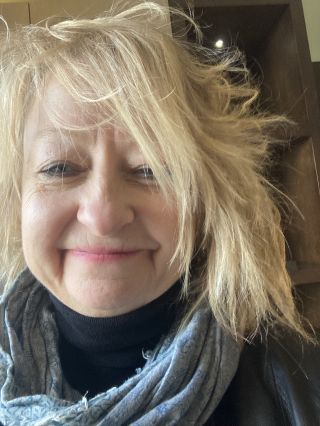Grief
Alchemy—The Transformation of Grief
Personal Perspective: Grief is woven into the tapestry that rebuilds your life.
Posted March 4, 2024 Reviewed by Michelle Quirk
Key points
- Grief brings the creative fire.
- Hold your grief close and let it rebuild your life.
- Grief is not something you get through, but something you live with.
The love of my life died just before COVID. By the time the rest of the world went into lockdown, I had already retreated to our little cottage sanctuary, where my husband and I had spent the last years of our marriage isolated by his illness, shockingly happy in our tiny little world. We knew what was coming. We shut the door on everything else.
I am not skirting the reality of illness, and this is not inspiration porn. But when we got through our raging and wailing, everything else fell away. It was just the three of us. He and I, and our German Shepherd, Leo, who supervised and watched over both of us.
Are You Writing?
My job was to take care of everything and my husband. His job was to survive. And he would sometimes take my hand and ask me . . . are you writing?
I am a novelist, and writing is what I do, and my husband, who knew me better than anyone ever will, understood. But writing opportunities, a daily part of my life, had gone rare. I had to bring my "A" game to the table, I had to learn to sleep in two-hour segments. I was a hot mess every single day, with the occasional moments of magnificence and a whole lot of not so great.
And, yet. Our last year was the most romantic year of our marriage.
Running a close second was the year we fell in love.
Falling in Love
I met my husband on a dating website, where I wrote that I loved and studied French and Italian, but was only fluent in Southern. He immediately got in touch. He told me he was born in France to an Italian family, so we would of course be perfect together. I always like a confident man.
We arranged a lunch for the weekend, but two days later he called and said it was too long to wait— could I please meet him for a drink that very night? I showed up, late, in the parking lot, top down on my old two-seater roadster, hair all over the place, in a sexy black sweater and my favorite jeans.
He was standing by his car waiting patiently—something he would get used to. He looked at me like he was stunned, then gave me a slow, rather fabulous, oddly vulnerable smile. I froze. I was wary of this incredibly handsome man who looked like he had fallen in love at first sight. But I was also aware of that voice in my head—And here he is. At last.
On our second date, he smirked and said, Since you are a thriller writer, where would you hide my body if you killed me? I said, That's easy. I took him down into the creepy basement and showed him the old coal chute. Right there, I said. Then I panicked, thinking, Easy come easy go, I'll never see this guy again. I learned later that he called his best buddy in France and said, I have met Lynn. If I disappear, you will find my body in the coal chute. We are having dinner in three nights.
Our third date lasted two weeks.
We moved in together and made plans to get married on a beach in Jamaica.
We had the usual issues. His kids. My kids. He was not used to a house full of animals and was outraged and then amused to find himself Number Five, after the horse, the cat, and two dogs. We rambled around the country. He was much in demand. I wrote my novels and he whipped manufacturing plants into shape while pissing everyone off, and we had many happy years.
And then he got sick. The forever kind of sick. He quit work. We curled up together in our little cottage. The days were ours.
We cried together when we lost our beloved German Shepherd rescue, Leo, and curled up together smiling weeks later with our new German Shepherd puppy, Leah.
And he would say to me, Are you writing?
And so began our family writing afternoons, where I would settle him onto the couch with Leah and a soft warm blanket, and turn on endless loops of Midsummer Murders. And I would curl up in my favorite chair, with a notebook and a pen, and get lost in the world of my novel. And whenever I looked up, he would be watching me. We called it Lynn TV.
Then his body wore out, and he died.
Freedom in Grief
There is enormous freedom in grief. An exhilarating autonomy. When nothing matters, when you have zero interest in a future and nothing whatsoever to hope for, things get simple, and it's pure relief. You don't have to find the answers if you don't have any questions.
Puppy and I curled up every evening for dinner and watched anything streaming in French. We didn't need to understand the dialog, we needed the rhythms of a language that was all we had left.
I wanted desperately to go to France, I was compelled to go to France, but I was trapped like everyone else by COVID-19.
Life came down to three things. Walk the dog. Write the novel. And there was that third thing. The idea.
The novel that had been building and taking shape in my head, the one I knew I could never write—it would be too painful, too personal, too private. The novel where I wrote about a widow who lost her husband who was French.
But my big brother always told me be brave. And the idea became impossible to resist. So, early one morning, my heroine Junie Lagarde got an emergency call, summoning her to France, to find her missing dog, Leo, and uncover the truth behind her husband's mysterious death in a plane crash on the most dangerous mountain in the world . . . Mont Blanc.
This ignited the creative fire that is one of the gifts of grief.
It wasn't my story anymore. It was hers. But I went right along with her. Real life faded into the background, a beautiful mercy. I woke up in the middle of the night to write, I wrote early in the mornings, I could not go for a walk without a torn-off sheet of paper and a pen in my pocket. My characters took on a life of their own, as they always do, and I lived in the novel, and it was glorious. I sent Junie to the Alps, the part of France my husband loved best, that has everything that scares me—glaciers packed with snow and ice; avalanches; the treacherous, frozen heights of the mountain; and deep, deep water in the lakes.
I walked with Junie as she lived her grief and found she had insight that astounded me. My novel knew me better than I knew myself. Junie gave voice to things I had not quite figured out. She told her husband how much she loved him every day, comforted by the love he sent back. I realized my husband was doing the same. Junie found her Leo and it healed her heart. And watching her find my Leo healed my heart, too.
Junie was a hot mess. Junie was opinionated and serenely uncompromising. Junie did not follow the grieving rules. And as she found her autonomy in the world, so did I.
Junie slept in her husband's sweaters. So did I. She kept her husband's razor in the bathroom. So did I. She refused to part with any of his old socks that she kept stuffed in a drawer that would barely close. So did I. She wore her wedding ring and his. So did I.
Junie decided to spend most of her time playing flamenco guitar. I decided to spend most of my time writing. Junie spent hours curled up lost in thought. I did the exact same thing. Neither one of us could ever remember what it was we thought about, but it didn't bother Junie, so it didn't bother me.
Then, Junie fell in love. Outrageous.
Something You Live With
But Junie said falling in love with one man while grieving another was perfectly natural . . . like adding another dog to the pack. Junie was wise enough to know that grief is not something you get through, but something you live with, and you never have to leave your true love behind.
And how could she resist this new man in her life, this man I brought back just for her, this Capitaine Philippe Brevard, who reminded me so much of my husband? How could either of us resist a story where he spoke and lived in a world I had created just for him?
I was finally able to go to France, to work on edits of the book, to watch Junie as she walked the streets of Annecy, fell in love yet again, and decided to stay in France forever.
And I found an ease and contentment in Annecy, while I worked on the novel and walked the streets myself, listening to the rhythms of speech that are like the music of my heart.
Junie cried when she returned to France because she was so happy to be there. I cried on the way home because I did not want to leave.

I had a long and serious talk with our Shepherd Leah, now grown up, who did not hesitate to give four paws up on the plan for a year to forever in France. I have lost the art of planning anything past Thursday, but here's hoping we make it.
Wherever I am, I'll be hard at work. It is the extraordinary art of the novel that sweeps you into a whole other world and shines a light on everything in life that is poignant and beautifully mundane.
And I remember my husband's voice, so close to me, so soft, on a particularly terrible day. Everything is perfect, he whispered.
It kind of is.




